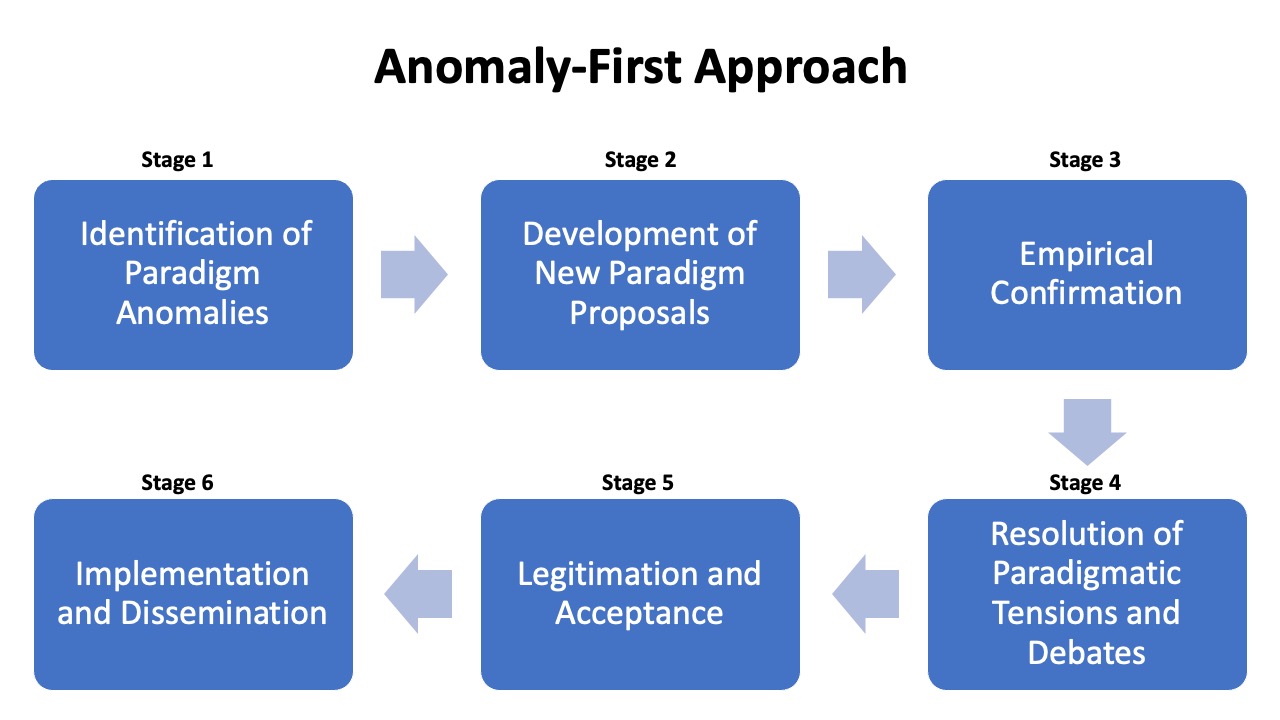The field of marketing is experiencing a revolutionary metamorphosis. An insightful editorial titled “Paradigms for Progress: An Anomaly-First Framework for Paradigm Development”, published in the Journal of Marketing, lays the foundation for a transformative approach to paradigm development in marketing science.
This anomaly-first approach is envisioned as a roadmap to understand, embrace, and integrate disruptive anomalies, driving the discipline of marketing towards new frontiers of knowledge and application.
The approach is unfolded through a meticulous six-stage model, aimed at leveraging deviations from established norms and theories—referred to as anomalies—as the catalysts for innovations and scientific progress within the field of marketing.

Stage 1: Identifying Paradigm-Anchoring Anomalies
The model commences by identifying anomalies that are potent enough to anchor new paradigms. These are deviations that prompt scholars to challenge and expand the existing realms of knowledge, acting as the seeds for revolutionary paradigms in marketing.
Stage 2: Develop New Paradigm Proposals
Once anomalies are identified, the next stage involves the formulation of coherent paradigm proposals. These proposals endeavor to amalgamate, contest, and build upon the existing paradigms, aiming to furnish a more encompassing understanding of the discovered anomalies.
Stage 3: Seek Empirical Confirmation
Empirical validation is the cornerstone of this stage, with scholars working to consolidate the credibility and relevance of the new paradigms through rigorous testing, verification, and refinement, ensuring that the paradigms aptly address the outlined anomalies.
Stage 4: Scrutinize and Debate
The ensuing stage is marked by intense debate and scrutiny from community stakeholders, researchers, and practitioners. This dialogue is crucial for dissecting and analyzing the constructs, methodologies, and implications of the proposed paradigms, ensuring their refinement and robustness.
Stage 5: Strive for Incontrovertible Evidence
This stage mandates the provision of incontrovertible evidence in support of the proposed paradigms, emphasizing transparency, a well-defined research agenda, and a sustained commitment to fostering paradigm-related communities.
Stage 6: Legitimize New Paradigm
The culmination of this journey is the multifaceted legitimization of the new paradigm, requiring a collective endeavor for its cognitive, normative, regulatory, and pragmatic validation by a spectrum of stakeholders, including educators, policy-makers, researchers, and practitioners.
This revolutionary approach underscores the importance of cross-disciplinary dialogue involving fields like psychology, economics, sociology, and computer science to address the multifaceted anomalies and challenges. By doing so, it ensures the holistic development and seamless integration of new paradigms into the academic and practical spheres of marketing.
Opinion
Marketing is poised on the brink of a revolutionary shift, one marked by an innovative anomaly-first approach to paradigm development, as highlighted in the editorial. This approach, which meticulously unfolds through a six-stage model, can potentially redefine our understanding and application of marketing paradigms, emphasizing the value of divergent thinking and anomaly integration in scientific advancements.
The Power of Anomalies:
Anomalies have conventionally been perceived as outliers, deviations from the norm that are often overlooked or considered disruptive to established theories and practices. However, this new approach encourages scholars and practitioners to embrace these deviations as opportunities for insight and discovery. The identification of paradigm-anchoring anomalies, ones that challenge and expand our existing knowledge frameworks, sets the stage for a more inclusive and holistic understanding of marketing phenomena.
Fostering Evolution:
The anomaly-first approach extends beyond mere identification. It advocates for the development of new paradigm proposals that encompass, challenge, and build upon the existing paradigms, thus providing a broader perspective to decipher the underlying anomalies. This approach catalyzes a cycle of intellectual evolution, fostering a culture of continuous learning, adaptation, and refinement, which is indispensable in today’s fast-paced, dynamic marketing environment.
Ensuring Credibility:
One of the most crucial elements of this innovative approach is its emphasis on empirical confirmation and rigorous debate. The approach necessitates meticulous testing, verification, and refinement of proposed paradigms, ensuring that they not only address the anomalies but are also robust and credible. The integration of intense scrutiny and debate among community stakeholders, practitioners, and researchers enhances the robustness and applicability of the paradigms, thereby bridging the gap between theoretical frameworks and practical applications.
Cross-disciplinary Collaboration:
The interweaving of insights from diverse fields such as psychology, economics, sociology, and computer science underlines the need for a multifaceted perspective in addressing the complex anomalies encountered in marketing. This cross-disciplinary dialogue is pivotal for holistic development and seamless integration of new paradigms, enabling a richer, more nuanced understanding of marketing science.
A Gateway to Transformation:
While the anomaly-first approach is revolutionary, its success is contingent upon collective endeavors. The legitimacy and acceptance of new paradigms require a concerted effort from a spectrum of stakeholders, including educators, policymakers, researchers, and practitioners, ensuring cognitive, normative, regulatory, and pragmatic validation.
Conclusion:
The anomaly-first approach, as articulated in the editorial offers a beacon of transformative thinking in marketing science. By placing anomalies at the center of paradigm development, it promises to usher in a new era marked by intellectual agility, enriched insights, and a symbiotic integration of varied knowledge domains. It is not merely a theoretical proposition but a call to action for every stakeholder in the marketing ecosystem to embrace anomalies as the harbingers of progress and innovation, fostering a landscape of enriched insights and advanced knowledge in marketing science.
This reflection is not an endorsement of disregarding established paradigms but an invitation to scrutinize, question, and enrich them. In doing so, we can hope to realize a future where the fusion of diverse thoughts, anomalies, and interdisciplinary insights propels marketing science into uncharted territories, paving the way for groundbreaking discoveries and enduring legacies in the field.
Reference:
Swaminathan, V., Lamberton, C., Sridhar, S., & Marinova, D. (2023). Paradigms for Progress: An Anomaly-First Framework for Paradigm Development. Journal of Marketing, 0(0). https://doi.org/10.1177/00222429231201959
